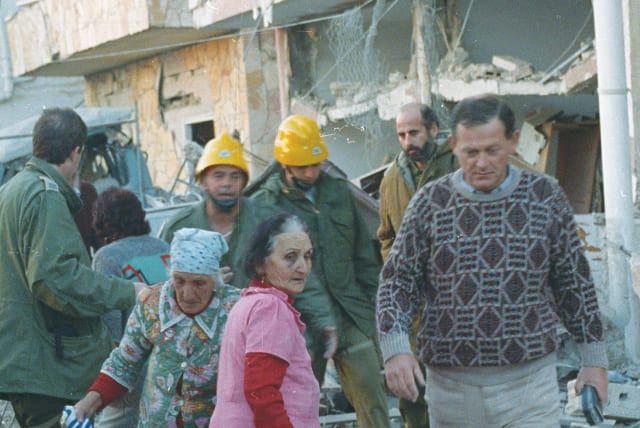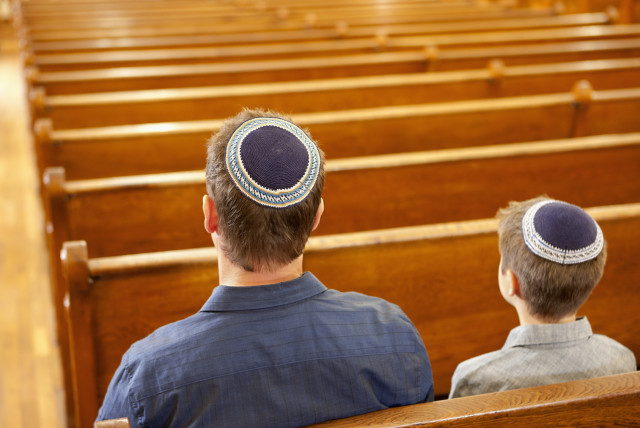No atheists in a foxhole: Turning to God during hardship - opinion

The adage, “There are no atheists in a foxhole” encapsulates this phenomenon, suggesting that in moments of peril, belief in a higher power surges, becoming a beacon of solace and hope.
In the crucible of crisis, where imminent disaster looms large, and uncertainty grips the heart, humanity’s relationship with faith undergoes a profound examination.
The adage, “There are no atheists in a foxhole” encapsulates this phenomenon, suggesting that in moments of peril, belief in a higher power surges, becoming a beacon of solace and hope amid the darkness of impending doom.
When one finds oneself in dire circumstances, the veneer of self-assurance crumbles and the fragility of human existence is laid bare. When faced with forces beyond one’s control, the primal instinct for self-preservation intertwines with a deep-seated yearning for divine intervention.
The pervasive sense of vulnerability strips away illusions of invincibility, compelling individuals to confront their mortality with a newfound humility.
Prayer becomes a lifeline during adversity
In the suffocating grip of uncertainty, faith emerges as a refuge, offering a semblance of comfort amid the storm. For many, prayer becomes a lifeline – a fervent plea for protection, a desperate entreaty for deliverance. The intensity of prayer reaches unprecedented heights as the realization dawns that human agency alone may prove insufficient in the face of overwhelming adversity.
The tumultuous events of the 1991 Gulf War provide a timely reminder of this phenomenon. As the conflict escalated and Scud missiles rained down upon targets in Israel, ordinary Israelis, men, women, and children found themselves thrust into a harrowing reality where the specter of death loomed ever closer.
There was talk of multiple hits with chemical warheads.
Amid the chaos, people were confined to rooms in their homes sealed with plastic sheeting, wearing gas masks in a desperate bid for survival, while awaiting the inevitable impact of incoming missiles. In the end, no weapons of mass destruction were used against Israel.
The general understanding is that the Scud missile attacks were meant to provoke Israel to respond so that former Iraqi dictator Saddam Hussein could use Israeli participation to drive a wedge among the countries of the coalition opposing his conquest of Kuwait.
However, the image of families huddled together in fear and seeking solace in whispered invocations epitomizes the innate human inclination to seek higher guidance in times of crisis.
In the silence of their homes, with the ominous hum of approaching missiles echoing in the distance, the boundaries between the material and the metaphysical blur.
In those fleeting moments of vulnerability, faith transcends doctrinal differences, uniting individuals in a collective yearning for divine intervention.
This was “us” last Saturday night.
We knew they were coming... lots of them. Drones, UAVs, missiles, bombs... Who knew what or where?
The collective prayer level rose more than a notch or two and penetrated the heavens.
With the help of the Almighty, our amazing IDF and their allies thwarted the onslaught and there were almost no casualties.
A modern-day miracle in conjunction with wonderful armed forces saved the day. Our prayers were answered.
HOWEVER, THE phenomenon of “no atheists in foxholes” also raises profound questions about the nature of faith and its relationship to human resilience.
Does the surge in religious fervor signify a genuine spiritual awakening or is it merely a reflexive response born out of fear and desperation? Can faith truly provide solace in the face of existential dread, or does it merely serve as a psychological crutch to cope with the incomprehensible?
Critics of the adage argue that it oversimplifies the complexity of belief systems, suggesting that faith is merely a byproduct of fear rather than a deeply held conviction. They contend that the assertion diminishes the experiences of atheists and agnostics who may navigate crises with stoicism and resolve, drawing strength from within rather than from “external” sources.
Moreover, the notion of faith as a prerequisite for courage undermines the resilience and fortitude exhibited by individuals who confront adversity without recourse to religious belief.
In the face of calamity, human ingenuity and solidarity often emerge as powerful forces for survival, transcending the boundaries of faith and ideology.
Yet, amid the cacophony of conflicting perspectives, one cannot deny the profound impact of crisis on the human psyche.
In the crucible of disaster, existential questions loom large, prompting individuals to confront the fragility of life and the limits of human agency. Whether through prayer or quiet contemplation, the quest for meaning persists, forging a tenuous connection between the finite and the infinite.
“There are no atheists in a foxhole” serves as a testament to the indomitable spirit of humanity – a reminder that in moments of profound vulnerability, the search for solace transcends formal theological boundaries, gravitating to the depths of what we call “the soul.”
Whether one finds refuge in prayer, philosophy, or sheer resilience, the capacity to endure amid adversity remains a testament to the enduring power of the human spirit.
Let’s all give a prayer of thanks to both God and man for our rescue from impending disaster.
The writer is a rabbi and physician living in Ramat Poleg, Netanya, and is a cofounder of Techelet-Inspiring Judaism.
Jerusalem Post Store
`; document.getElementById("linkPremium").innerHTML = cont; var divWithLink = document.getElementById("premium-link"); if (divWithLink !== null && divWithLink !== 'undefined') { divWithLink.style.border = "solid 1px #cb0f3e"; divWithLink.style.textAlign = "center"; divWithLink.style.marginBottom = "15px"; divWithLink.style.marginTop = "15px"; divWithLink.style.width = "100%"; divWithLink.style.backgroundColor = "#122952"; divWithLink.style.color = "#ffffff"; divWithLink.style.lineHeight = "1.5"; } } (function (v, i) { });

